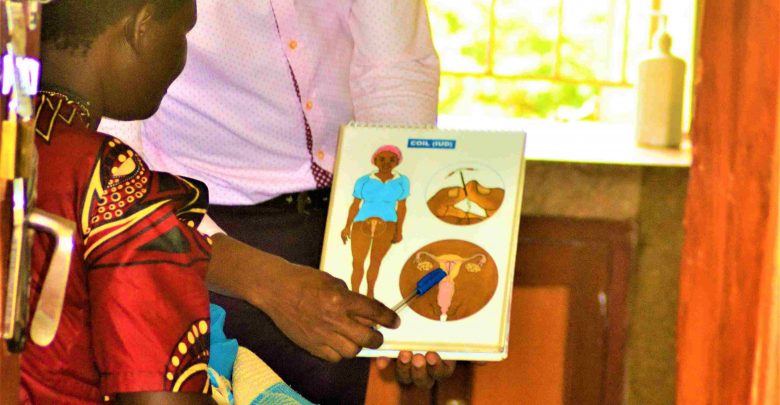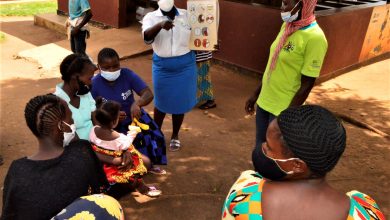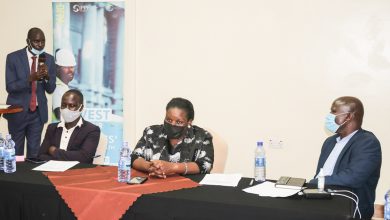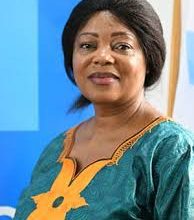
Health
Free maternal services are a lifeline to expectant mothers in Uganda
The Danish International Agency (DANIDA), with assistance from the Republic of the Netherlands, also supports the RHU Adjumani clinic, where Eimani went shortly after giving birth. When Alier approached the doctor and said that they didn't have any money, he was told that everything, from treatment to drugs, was free because she had attended one of the RHU outreaches in Ayilo II refugee camp.
By Lillian Aroma
Eimani nearly fell off the back of a borrowed bicycle three times on her journey to the hospital to give birth. A lack of suitable mobility, along with poor access roads, has resulted in expensive commuting expenditures, and her husband, Alier, earns a pittance from his gardening work in the Nyumanzi refugee camp.
That’s how she held herself on the back of her brother law’s bicycle to keep her from falling. They moved down along terrible roads for more than 30 kilometers as they traveled from a secluded settlement in Mokoloyoro village, Adjumani district.
“I thought it was the end; there was no chance for me or my child to live,” Eimani, 32, said. “However, I had to resist. I couldn’t stay at home due to the high risk of major bleeding or death.”
Gisma, 25, had lost two previous pregnancies in her five-year marriage owing to a lack of obstetric care in her small Kikaikya village in Kikuube district, which had no hospital, pharmacy, or safe drinking water. She was able to keep the pregnancy going with the aid of a Reproductive Health Uganda (RHU) sponsored midwife who identified her illness and offered her maternal drugs. Because RHU is the only supplier of maternal medicine in the district, she was able to keep the pregnancy going. Thank you to the United Nations Population Fund (UNFPA), Danish Ministry of Foreign Affairs and the Advance Family Planning initiative (AFP) program for assisting in the delivery of maternity and family planning services to Uganda’s most vulnerable citizens.
Gisma, a refugee from the Democratic Republic of the Congo (DRC), began to show indications of weariness at nine months. “I attempted several times to go to the hospital, which is more than 25 kilometers away, but I couldn’t because I didn’t have the money,” she explained. “What I was most terrified of was that many mothers in my community lost their lives or their infants without health care or on the way to the nearest hospital,” she said near the conclusion of her pregnancy.
When Gisma was ready to give birth, her husband, Kule, requested everyone in the community who owned a motorcycle to lend it to her so she could be taken to the hospital. He said that due to a serious lack of gasoline, none of them were able to assist him. “With all my funds, I went to the black market and bought two litres of petroleum at an outrageous price: each litre cost more than 7000 shillings.”
In Uganda, around 350 women out of 100,000 die during giving birth. In Uganda, 16 women die every day, with neonatal causes accounting for 42 percent of all deaths. One out of every three women who wants to utilize family planning is unable to do so. Five out of every ten deliveries take happen without the presence of a competent birth attendant.
The inflow of immigrants in Uganda has driven the country’s health system to its knees. Uganda has 6,953 operating health institutions spread across the nation. Only two out of every ten functioning health institutions offer services for maternity, child, and family planning.
RHU supported 111 health facilities in 2021 with the support of UNFPA, AFP, and the Danish Ministry of Foreign Affairs, but the Danish Ministry of Foreign Affairs is ending its services at the end of March, and the Advance Family Planning initiative is closing operations in October 2022, putting the lives of 10 million women in grave danger, including 600,000 refugee women who could die from complications during childbirth. According to a recent estimate, over 900,000 pregnant and breastfeeding women are also malnourished.
RHU must continue to provide reproductive health care, family planning, and women’s protection services until the end of 2022.
However, there appears to be a new beginning at the conclusion of the voyage.
Eimani was quickly transferred to the operating room when she arrived at the Medical Teams International-supported Pagirinya Health Centre III, which was funded by the UNHCR, Uganda OPM, PRM, United Nations Children’s Fund (UNICEF), United States Agency for International Development (USAID), and the Bill and Melinda Gates Foundation.
“She got in touch with us at the last minute. She and her child were going to perish”.
Eimani, cradling her new baby daughter, had a harrowing trip on her way to the hospital. Rare means of transport have made transportation just one more worry for expectant parents.
“She reached us at the last minute. Her doctor said: “She and her baby were about to die.” “The operation was a success; her baby is in the incubator and she is in stable condition.” She added, “The free medical services that we provide are the only hope for women like Eimani. I can hardly imagine how many mothers and babies will die if these services are stopped. “
The Danish International Agency (DANIDA), with assistance from the Republic of the Netherlands, also supports the RHU Adjumani clinic, where Eimani went shortly after giving birth. When Alier approached the doctor and said that they didn’t have any money, he was told that everything, from treatment to drugs, was free because she had attended one of the RHU outreaches in Ayilo II refugee camp.
“It was my first time receiving free obstetric care,” Eimani, who had a baby boy, said. “I wish it had always been accessible, and I wish all the women in my village could access and maintain these services.”
Gisma gave birth to a daughter, Favor. “We nearly lost its significance in the face of this terrible transportation system that transformed our lives into tragedies,” she explained.
They didn’t, however, lose the baby or her name, which means “beloved kid.”




